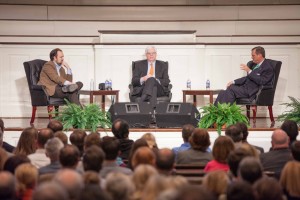By Aaron Cline Hanbury
LOUISVILLE, Ky. (SBTS) — While “cultural Christianity is dead” in an increasingly secular America, evangelicals have the “theological resources” to keep the faith, R. Albert Mohler Jr. said during a public discussion about faith and politics on the campus of The Southern Baptist Theological Seminary.

R. Albert Mohler Jr., (right) president of The Southern Baptist Theological Seminary, discusses religion in public life with The New York Times columnist Ross Douthat (left) and radio talk show host Dennis Prager during a Jan. 28 event in Southern Seminary’s Alumni Memorial Chapel.
Mohler, the president of the seminary, joined nationally syndicated radio show host and conservative pundit Dennis Prager and The New York Times columnist Ross Douthat for the event, “Faith and Freedom in the Public Square,” Jan. 28. The trio of public intellectuals engaged in a frank, wide-ranging and often entertaining two-hour discussion of secularism and shifting morality in America.
Douthat, a Roman Catholic whose 2013 book about religion in the United States, Bad Religion, received wide acclaim and appeared on the The New York Times bestsellers’ list, opened the evening with a “view from Washington.” He offered a “distillation” of the socio-religious environment — the cultural conversation on issues such as religious liberty and faith and politics — in the nation’s capital.
“The view from my city is that we are in this kind of post-culture war era in American politics,” he said, describing an era in which most consider “religious conservatism” as “mostly gone into retreat.”
Douthat, who moved to D.C. in the 1990s, recalled the debates surrounding the “religious right,” the Moral Majority and more recent controversies concerning the role of faith in major political debates.
“It’s remarkable to me as someone who was there for those debates, and participated in them, to see how quickly — this was just six or seven years ago — the conversation has shifted, and how strong the assumption is among American journalists, people in the American media and people who work in politics that the sort of post-1970s religious right versus secular left cultural battles are of yesterday,” he said.
The consensus, he suggested, is that “religious conservatism is weakening, that America in general is suddenly secularizing in ways that people didn’t expect 10 or 15 years ago — that what’s happening in the debate about gay marriage is kind of a microcosm of these trends as a whole — and that, frankly, if there is a sort of future in the debates about religious and politics, it’s more likely to be defined by some resurgent religious liberalism, which a lot of people are very eager to identify with the new Pope.”
Reacting to Douthat’s summary of the nation’s cultural ethos, Mohler pushed back against the idea that everything has changed since the culture wars of recent decades, saying that “the culture wars are over, except for where they’re not.” He noted specifically that the issue of abortion is today “more divisive than at any point since Roe v. Wade in 1973.”
But, according to Mohler, the major difference in today’s socio-religious world compared to that of the previous generation — the biggest shift — is a move away from a wide, almost requisite, acceptance of religion in all facets of public life.
“There was in the center of the country — and I don’t mean that geographically, but culturally — a cultural religiosity that was, in the main, a cultural Christianity that trended in one direction for the better part of 60 to 70 years, and it had a kind of moral authority that is disappearing before our eyes,” said Mohler, an evangelical theologian, who himself is the author of several books about cultural trends, as well as the host of a daily podcast in which he analyzes the news from a Christian viewpoint.
Prager, a practicing Jew who, in addition to his radio show, is a syndicated columnist and author, responded by suggesting several ways in which “this country is changing,” each of which he tied to the loss of belief in a transcendent God or moral standard. He named “loss of meaning” and of objective morality.
“We live in the age of feelings,” he said, citing abortion rights as the greatest example of individual feelings guiding contemporary morality. “[The unborn child’s] worth is entirely dictated by the feelings of the mother. It is an unbelievable statement of narcissism, which is what happens when there is no transcendent morality.”
Pushing further with his theological argument, Prager pointed to assumptions about the nature of humanity as the fundamental dividing line between liberals and conservatives today.
“Everything in leftism [a term for both religious and political liberalism] follows from the belief that people are basically good,” he said. “And everything in conservatism follows from the belief that people are not basically good. Judaism and Christianity were united in teaching that people were not basically good. With the death of traditional Judaism and traditional Christianity, you have the unbelievably dangerous belief that people are basically good and everything flows from there to big government to believing that your opinion is what makes things moral. And that’s where we now stand.”
After the three conversation partners offered their surveys of the contemporary American religious landscape, Douthat posed a question about the declining number of “religious persons” in the United States.
Concerning evangelicals, Mohler admitted that “right now, there are fewer evangelicals by theological definition than the sociologists tell us there are.” But the issue, he said, is not evangelicals departing from their genuine beliefs. Rather, many of those who, in a previous generation, self-identified as “evangelical” no longer do so. He alluded to a mid-20th-century America, particularly in the South, where affiliation with a church or religious group brought a certain amount of social and cultural credibility.
“Cultural Christianity,” Mohler said, “is dead.”
Mohler, however, was not entirely pessimistic.
“I’m pretty convinced, if I can give you good news,” he said, “that there are going to be evangelicals who keep the faith. Evangelicals in the main, though tempted by any number of things, have theological resources, if they will lean into them, that will prevent some of the things that have happened elsewhere,” he said, referencing the near disappearance of liberal Protestant denominations like the Presbyterian Church (USA).
While conceding Mohler’s point, Douthat questioned whether or not theologically defined conservative religion could restore conservative values to cultural prominence.
“The resilience of conservative religion may not have been as resilient as a lot of conservative believers hoped it was,” Douthat said, adding that though theological grounding may be “enough for survival,” it may not be “enough to restore its flourishing.”
Returning to an earlier point about transcendent authority, Mohler claimed that the primary difference in religious groups that fade away and those that continue to thrive is “oughtness.”
“If there’s no binding authority — if there’s no ‘ought’ — then no one is going to pay to repair the [church] roof. And no one is going to feel guilty for not going” to church, Mohler said.
He continued, “If you look at conservative Catholics and the conservative Jewish community, the conservative evangelicals, what you find is persons who actually believe there is a huge ‘ought,’ there is a transcendent reality, which is to say, God to whom we are answerable and there is something at stake.”
After nearly two hours of conversation that covered topics from civil rights to party platforms, the three men received questions for the audience. Questions and answers ranged from the “loss of God” in public discourse to conservative involvement in pop culture, from the so-called cultural “war on men” to same-sex marriage.
The event emcee was Warren Cole Smith, associate publisher and vice president of WORLD magazine, who introduced the panelists and moderated the question and answer portion of the evening. WORLD, the largest Christian news magazine in the United States, co-sponsored the event with Hashtag Productions.







